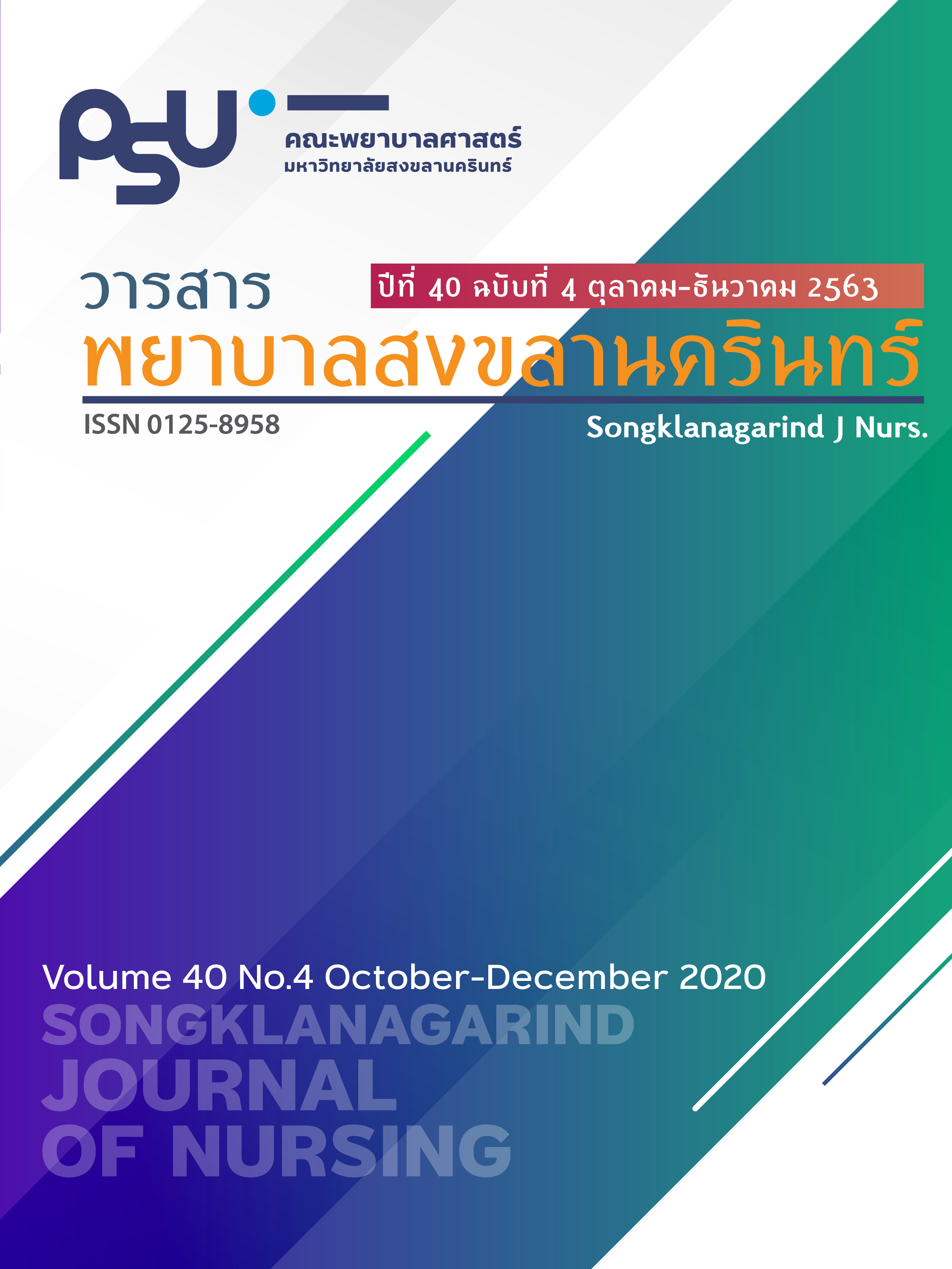Dietary Management for Prevention and Reduction Risk of Non-communicable Diseases
Main Article Content
Abstract
Non-communicable diseases (NCDs) are major health problems that are the greatest component of the total burden of disease in Thailand and globally. In recent years, NCDs have shown increasing impacts on health status and rapid rising of the magnitude of health problems. Major risk factors of NCDs include harmful health behavior, physical inactivity and unhealthy diet, particularly over eating of added sugar, salty, fatty and greasy food in which low fiber. In addition, public awareness of risk factors of NCDs and knowledge regarding prevention of NCDs is needed more improved. Nurses serve as an essential role in safeguarding and prevention of NCDs through facilitates recommendations to adjust a diet plan, provide nutrition education and proper eating habit to individual Clients about their health. Nures also play a role in sustaining health-promoting behaviors associated with reducing NCDs risk factors.
Article Details
References
WHO. Noncommunicable diseases country profiles 2018. Geneva: WHO; 2018.
WHO. Global status report on noncommunicable diseases 2014: World Health Organization; 2014.
Bureau of Health Promotion Policy Research. NCDs report. Nontaburi: Department of International Health Policy Development; 2014. Thai.
Ministry of Public Health. Division of Non Communicable Diseases. Number and rate of Non-communicable diseases 2016-2018 [Internet]. 2019 [cited 2019 Nov 20]. Available from: http://www.thaincd.com/2016/mission/documents-detail.php?id=13653&tid=32&gid=1-020. Thai.
Ministry of Digital Economy. Division National Statistical Office. Social Statistics. The 2017 food consumption behavior survey: Statistical forecasting. Division National Statistical Office. Bangkok: Division; 2018. Thai.
World Health Organization. Noncommunicable diseases key fact [Internet]. 2016 [cited 2019 Aug 18]. Available from: https://www.who.int/en/news-room/fact-sheets/detail/noncommunicable-diseases
Griffin JD, Lichtenstein AH. Dietary cholesterol and plasma lipoprotein profiles: Randomized controlled trials. Curr Nutr Rep. 2013; 2(4): 274-82. doi: 10.1007/s13668-013-0064-0.
Karam I, Yang YJ, Li JY. Hyperlipidemia background and progress. SM Atheroscler J. 2017; 1(1): 1003.
Grundy S, Stone N, Bailey A, et al. Guideline on the management of blood cholesterol: A report of the American College of Cardiology/American heart association task force on clinical practice guidelines. J Am Coll Cardiol. 2018; 73(24): e285-350.
Ministry of Public Health. Department of Health. Division of Nutrition. Cholesterol and fatty acids in Thai foods [Internet]. 2014 [cited 2019 Nov 21]. Available from: http://nutrition.anamai.moph.go.th/images/files/cholesterol_n.pdf. Thai.
Iqbal MP. Trans fatty acids-A risk factor for cardiovascular disease. Pak J Med Sci. 2014; 30(1): 194-97. doi: 10.12669/pjms.301.4525.
Mach F, Baigent C, Catapano AL, et al. Erratum to “2019 ESC/EAS guidelines for the management of dyslipidemias: Lipid modification to reduce cardiovascular risk” [Atherosclerosis 290(2019) 140-205]. Atherosclerosis. 2020; 292: 160-2. doi: 10.1016/j.atherosclerosis.2019.11.020.
Sacks FM, Lichtenstein AH, Wu JH, et al. Dietary fats and cardiovascular disease: a presidential advisory from the American Heart Association. Circulation. 2017; 136(3): e1-e23. doi: https://doi.org/10.1161/CIR.0000000000000510.
Ministry of Public Health. Department of Health. Division of Nutrition. Nutritive values of Thai foods [Internet]. 2001 [cited 2020 Aug 18]. Available from: http://nutrition.anamai.moph.go.th/images/file/nutritive_values_of_thai_foods.pdf. Thai.
Briggs MA, Petersen KS, Kris-Etherton PM, editors. Saturated fatty acids and cardiovascular disease: replacements for saturated fat to reduce cardiovascular risk. Healthcare. 2017; 5(2): 29. doi: https://doi.org/10.3390/healthcare5020029.
Maleewong K, Saiwong N, Sinawat S, et al. Survey of Sodium chloride (NaCl) consumption among Thai population. Health Promotion and Environmental Health. 2013; 36: 118-28. Thai.
World Health Organization. Guideline: Sodium intake for adults and children. Geneva, WHO, 2012.
Thai Hypertension Society. 2019 Thai guidelines on the treatment of Hypertension. Chiang Mai:
Trick Think; 2019. Thai.
Bhumirajanagarindra Kidney Institute Hospital. Nutrition recommendation for kidney disease. Bangkok: Hospital; 2014. Thai.
Subcommittee on Food and Nutrition Knowledge for Consumer. Food and nutrition knowledge for all age. Nontaburi: Organization; 2016. Thai.
Ministry of Public Health. Department of Disease Control. Strategy for salt and sodium reduction in Thailand year 2016-2025. Bangkok: Department; 2016. Thai.
Ungchusak C. Sugar health and appropriated consumption. Bangkok: Veterans Relief Organization in the Royal Patroage; 2012. Thai.
Ministry of Public Health. Department of Health. Division of Nutrition. Nutrition flag [Internet]. 2001 [cited 2019 Aug 18]. Available from:http://nutrition.anamai.moph.go.th/images/files/tong2.jpg. Thai.
WHO. Guideline: Sugars intake for adults and children. World Health Organization Geneva, Switzerland: WHO Press. 2015.
Tongpang S. Food exchange list [Brochure]. Bangkok: Siriraj Diabetes center; 2015. Thai.
Perry J, Ying W. A review of physiological effects of soluble and insoluble dietary fibers. J Nutr Food Sci. 2016; 6(2): 476. doi: 10.4172/2155-9600.1000476.
Ratanopas W. Good eat for good health in the 21 th century. J Sci Tech. 2017; 4(1): 1-14.
Strategy and planning group, Department of disease control, Ministry of Public health. National 5-year non-communicable disease prevention and strategic plan ( 2017-2021). Bureau of non-communicable diseases,
Department of Disease Control, Ministry of Public Health; 2017. Thai.
Hanucharurnkul S, editors. Nursing: Science of practice. Bangkok: VJ Printing; 1999. Thai.
Narasri P, Chaladthanyagid K, Piaseu N. Nurses’roles in primary care management of non-communicable disease toward sustainable development goals. Rama Nurs J. 2017; 23(1): 27-43. Thai.
Kongprasert J, editors. Guide to behavior modification in quality NCDs Clinic. [Internet]. 2015 [cited 2020 Oct 24]. Available from http://thaincd.com/document/file/download/knowledge/
Clinic-NCD2015.pdf.


